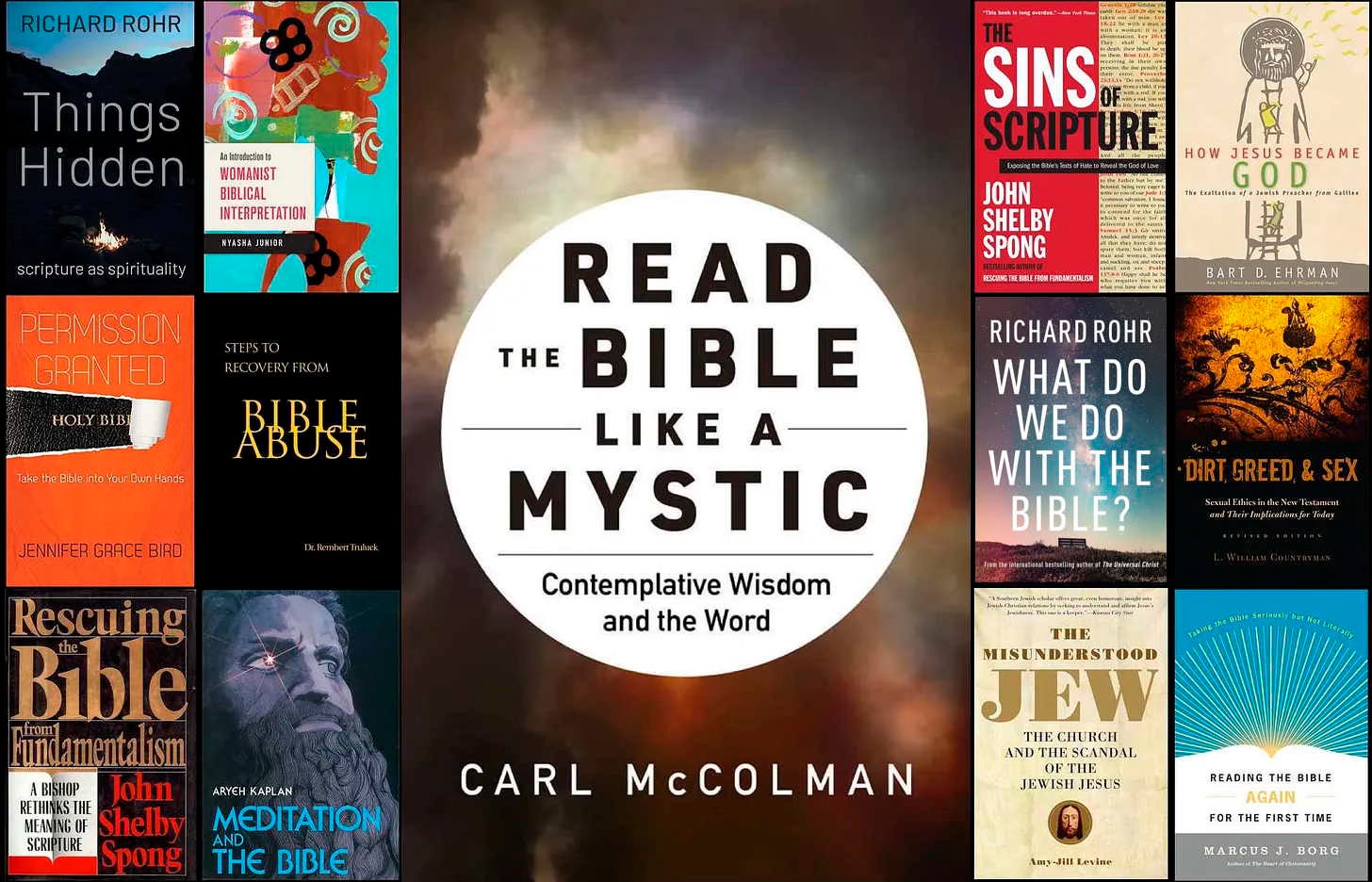Books To Change the Way You Read The Bible
Let go of literalism, authoritarianism, or narrow moralism: scripture is much more weird and wonderful, with love and justice at its core.
Today’s post is inspired by a website called Shepherd.com, which invites authors to create lists of their favorite books (excluding ones they wrote). It’s worth checking out. I like their concept, so I agreed to create a list for them. But the Shepherd format limits me to just five books in a list, so I’ve decided to offer an expanded version here.
Revolutionize Your Understanding of the Bible
My latest book, Read the Bible Like a Mystic, is an invitation to learn a new way of understanding and appreciating the sacred scripture at the heart of Judaism, Christianity, and western mysticism. In my life, I’ve been taught different ways to view, understand and read the Bible: literally, metaphorically, academically, and even skeptically. But I’ve come to see that reading the Bible mystically is the most spiritually rewarding approach — because it combines the best of devotional, scholarly, and even critical ways of reading, weaving them all into an appreciation of the Bible as a gateway into the mysteries of divine love and joy.
The Bible is an ancient text, which unfortunately has been been used in truly negative and harmful ways — to justify slavery, for example, or to dismiss some of the findings of modern science or psychology. Because of this, many people reject the Bible as a hopelessly superstitious, sexist and homophobic book. But even after acknowledging its problems and the harmful ways that the Bible has been abused, we can still find much to value in its pages — scripture remains, overall, a priceless treasury of spiritual wisdom. By following the example of ancient mystics — people who studied and prayed with the Bible not, as a kind of legal code, but as a poetic expression of divine love — we can recapture the real wisdom of scripture, without having to deny its problems or how it’s been abused. It is my hope that Read the Bible Like a Mystic can help anyone who wants to rediscover an honest but spiritually affirming understanding of the Bible.
Like any book, Read the Bible Like a Mystic was not written in a vacuum. I’ve been a serious (lay/amateur, but serious nevertheless) student of the Bible for over forty years now, and while most books that I have found the most helpful have been general books written for the non-specialist, it has been the fruit of my decades of personal research that helped make it possible for me to write my own “love letter to scripture.” So in today’s post, I acknowledge ten books that inspired me as I worked on RtBLaM. Most of these are accessible, non-academic books that almost anyone can pick up and enjoy. I hope that if you are looking for new ways of appreciating the Bible, or if you want to take the ideas I explore in Read the Bible Like a Mystic further and deeper, that this list will help you to find some great books to read: titles to help you as you read the west’s single most mystical book, the Bible.
Things Hidden: Scripture as Spirituality
I’ve read a number of books about the Bible over the years, from academic monographs to commentaries to popular and devotional reads. Hands down, Richard Rohr’s Things Hidden: Scripture as Spirituality is my single favorite book about scripture. This is not surprising, considering the author: Rohr is perhaps the most celebrated living Christian contemplative writer. Like most of the books on this list, Things Hidden is an accessible, easy to read book, although clearly informed by the best Biblical scholarship. It celebrates the Bible for its spiritual meaning, rather than getting mired in dogma, philosophy, or moralism. Most important of all, it provides insight into how the Bible tells a centuries-long story of how people (first, the Jewish community, and later on, the earliest Christians) over time grew to understand God as an infinite loving creator. Here is an understanding of the Bible that stresses the spirituality of relationship, and that recognizes how faith, like any love affair, has its ups and downs, its conflicts and resolutions. Rohr helped me to understand that the difficult passages of the Bible are evidence that our ancestors didn’t always get it right, but they kept on trying to be faithful to the God of Love, and so eventually the Bible emerges as a love song to Love: it’s imperfect, but it’s still a treasure.
Bonus recommendation: also check out Richard Rohr’s What Do We Do With the Bible? — a shorter book that really dives deep into the necessity of bringing a mystical sensibility to the Bible: don’t just read it like a mystic, learn to read it as a mystic!
Permission Granted: Take the Bible Into Your Own Hands
Jennifer Bird is a Bible scholar, but first and foremost she is an educator, and her book Permission Granted: Take the Bible Into Your Own Hands is a truly inspirational (and invitational) guide to learning a new way of reading scripture. She doesn’t shy away from the tough issues (yes, there’s a chapter on sex, and another chapter on violence, among other issues she tackles) but the overall thrust of this book is less about commentary and more about simply encouraging the reader to trust your own knowledge and perspective as you open the Bible for your own spiritual benefit.
For many years, I felt intimidated by Biblical commentaries because they were written by brilliant scholars and researchers who devoted their entire lives to the Bible. But Jennifer Bird reminds readers like me that it’s okay to bring a layperson’s perspective to scripture. As her title indicates, she gives everyone permission to discover our own ways of relating to this ancient text. Naturally, she’s not promoting fundamentalism, but rather gives us permission to balance an academic appreciation of Biblical knowledge with a personal encounter with the Spirit of love who truly inspired the Biblical writers. If you’re looking for a thoughtful guide to how to balance solid scholarship with meaningful spirituality, this book will be a blessing for you.
Reading the Bible Again for the First Time
Anyone who is familiar with Marcus Borg (1942-2015) will not be surprised to see his wonderful book about the Bible prominently featured on this list. Reading the Bible Again for the First Time: Taking the Bible Seriously But Not Literally provides a map for reconciling science and criticism with meaningful, heartfelt spirituality. At least as far as the Bible is concerned, you do not have to choose between the two.
Borg combines quality scholarship with an almost mystical appreciation of the wisdom encoded in the ancient scripture. For me, reading his book was an invitation not only to read the Bible anew, but to fall in love with it all over again. Drawing on his own rich scholarship and knowledge, he offers a basic survey of both the Old and New Testaments, and provides basic insights into how a literary, metaphorical and imaginative approach to the Bible actually makes it come alive and new and meaningful ways. To read the Bible literally is to throttle it of its true mystical beauty and power; I so appreciate Marcus Borg who provided us with such a beautiful alternative.
Meditation and the Bible
Here is the first of two books written by Jewish scholars who helped me, as a Christian reader, to radically deepen and open up my understanding of scripture. Meditation and the Bible was written by Aryeh Kaplan (1934-1983), an Orthodox rabbi and kabbalist, who clearly had more than just an academic interest in Jewish mysticism. Some Christians who believe mysticism and Christianity do not mix will claim — erroneously — that meditation and contemplation are nowhere to be found in the Bible; Rabbi Kaplan’s book is, it seems to me, the perfect refutation of that uninformed claim. Being a rabbi, Kaplan naturally confines himself to what Christians call the Old Testament, but he provides plenty of evidence of how different meditation practices were part of the ancient Jewish spiritual landscape. Engaging in a practice he called “Verbal Archaeology,” he brings his rabbinical knowledge of Hebrew to bear on show his readers just how much has been lost in translation; but the mystical foundations of the Bible remain encoded within it, and most of us just need a guide as perceptive and contemplative as Aryeh Kaplan to discover the meditative wisdom of the Bible for ourselves.
The Misunderstood Jew
Amy-Jill Levine is a professor of New Testament and Jewish studies at Hartford International University for Religion and Peace; prior to that she was on the faculty of Vanderbilt University in Nashville. As she tells her story, she grew up in a Jewish household where her parents encouraged her to explore other religions, which led to her lifelong appreciation for Jesus and the New Testament — through Jewish eyes, of course. Just as Aryeh Kaplan helped me to read the Old Testament through Jewish (mystical) eyes, Amy-Jill Levine introduced me to a new understanding of Jesus and the New Testament, which once again completely revolutionized my understanding of the Bible and my appreciation for its wisdom. More scholarly than mystical, Levine brings primarily an academic sensibility to her impressive collection of books on Jesus and the New Testament, but her writing is accessible and forged in a clear love for Jesus and appreciation of his message — which, of course, she reinterprets in the light of a Jewish sensibility. As its title suggests, The Misunderstood Jew: The Church and the Scandal of the Jewish Jesus reminds us that Jesus lived and died as a Jew; his words and his teachings come alive in new and surprising ways when we take seriously his Jewish identity. But she also takes to task the sorry history of antisemitism within Christianity, noting how Christian prejudice has impoverished our ability to fully understand the wisdom and insight of Jesus the Jew. What I especially love about this book is not only how much it enriched my understanding of Jesus but also how it underscores the need to see how context is crucial for a careful reading of the Bible: knowing the social and historical background makes it so much easier to appreciate the spiritual wisdom in the sacred text.
How Jesus Became God
How Jesus Became God: The Exaltation of a Jewish Preacher from Galilee by Bart D. Ehrman offers an unflinching look at the historical dynamics behind the emergence of one of Christianity’s central doctrines: the divinity of Christ. Even a casual reading of the gospels of Mark and John (which was written about 25 years after Mark) shows that the understanding of Jesus evolved rapidly during the first century of the Christian era: in Mark’s Gospel Jesus is depicted very much as an ordinary human being, while John emphasizes Jesus’s authority, power, and even divinity. In other words: the idea that Jesus is Lord, or Christ is God, evolved gradually over time during the first centuries of Christianity; and Ehrman offers a reasonable explanation of how this teaching emerged. Fundamentalists and other conservatives might see this as an attack on their faith, but for those of us who are willing to balance critical scholarship with our experience of faith, Ehrman offers an insight into how the Bible can be understood — as the record of an evolving faith.
The Sins of Scripture
Before Bart D. Ehrman, there was Bishop John Shelby Spong (1931-2021). Perhaps because of his long-standing championship of LGBTQ persons in the life of the Episcopal Church, he became a lightning rod for conservatives; the fact that he brought an unapologetically critical approach to his reading of scripture probably didn’t help his reputation among traditionalists. But for anyone seeking an honest and rigorously academic approach to the Bible, Spong was a breath of fresh air. In my book, I devote one chapter to the “clobber verses” — the difficult passages in the Bible that have been used/abused to attack, silence, or marginalize women, queer people, and others viewed as “outsiders” by fundamentalists. But Spong’s The Sins of Scripture: Exposing the Bible's Texts of Hate to Reveal the God of Love goes much deeper than my single chapter. I’ve had readers tell me that it was difficult to read my survey of the Bible’s “sins” so Spong’s more in-depth analysis might not be for everyone. But if you are committed to reading the Bible honestly, then this is a book to seriously consider.
Bonus recommendation: also check out John Shelby Spong’s Rescuing the Bible from Fundamentalism. I think the title pretty much sums it all up.
Dirt, Greed and Sex
L. William Countryman’s Dirt, Greed, and Sex: Sexual Ethics in the New Testament and Their Implications for Today is probably the most academic book on this list, but it’s well worth reading (and I thought it was accessible, so I trust that most people with a college education would find this to be a stimulating and thought-provoking read). Countryman taught New Testament at the Church Divinity School of the Pacific, and wrote several books on Biblical criticism and spirituality; but I believe Dirt, Greed and Sex will be the book of his to make the most lasting contribution. Unlike Spong (or me) who simply point out how the Bible gets abused, Countryman offers a new way of approaching the Bible’s understanding of sexuality, suggesting that scripture does not clearly distinguish sexual ethics from other ethical concerns, such as purity codes (the rules by which a community understands what is clean versus what is unclean) and property laws (since in ancient patriarchal societies women were regarded as the property of their fathers or husbands). When we deconstruct the patriarchal and cultic distortions of the Biblical understanding of sexuality, what emerges is a much more radical (and liberational) understanding of eros. This is not a particularly “mystical” book, but well worth reading for how it invites us to see the Bible in radically new ways.
Steps to Recovery from Bible Abuse
Countryman’s interpretation of the Bible has been warmly accepted by the LGBTQ community, since it creates the space for radically rethinking what the Bible says (and doesn’t say) about same-sex eroticism and relationships. But a slightly different approach to the vexing question of how to connect the Bible to the queer experience comes from Rembert S. Truluck (1934-2008), whose deeply pastoral Steps to Recovery from Bible Abuse is meant especially for those who have been hurt by exclusionary religion. Truluck was a Southern Baptist pastor and professor of religion until he was asked to resign from his teaching position because of his sexual orientation. He went on to become a minister with the Metropolitan Community Church, and started a website to help queer Christians to overcome how they had been hurt by Bible abuse. This book — all 550 pages of it! — is based on material from his website (now unfortunately offline, following Truluck’s death). Steps to Recovery from Bible Abuse combines a traditional Baptist love for scripture with the reality of life as a faithful gay Christian, Truluck’s careful and systematic approach to reclaiming the Bible from the hands of those who use it to condemn others is inspirational not just for the queer community but for anyone who seeks a healthier understanding of scripture.
An Introduction to Womanist Biblical Interpretation
I hope that it has become obvious by now that I believe an important element in developing a more holistic understanding of the Bible is to learn how to read and interpret the Bible from perspectives different than your own. As someone who has been a Christian my entire life, I’ve benefited tremendously from the wisdom of Jewish scholars like Aryeh Kaplan and Amy-Jill Levine; likewise, as a white person who was assigned male at birth, I gain tremendous insight from the wisdom of women of color, like Nyasha Junior, a Hebrew Bible scholar who teaches at the University of Toronto. She is one of many compelling voices in the field of womanist Biblical interpretation — an approach to scripture shaped by the unique experience of women of color. She has written several books, but An Introduction to Womanist Biblical Interpretation is an excellent primer for those who are new to womanist theology.
Looking back over this list, I recognize that it is geared more toward scholarship than toward mysticism, even though most of the authors on this list are concerned with appreciating the spirituality of scripture. I suppose that’s why I wrote Read the Bible Like a Mystic, for I felt that there was a need for a popular, introductory book exploring the relationship between contemplation and a mystical approach to the Bible. There are certainly other authors, past and present, who have explored this interface — Vincent Pizzuto and Joy A. Schroeder are two who come to mind. But if all else fails, pair the books on this list with the writings of the mystics themselves: Julian of Norwich, Teresa of Ávila, John of the Cross, Meister Eckhart, Howard Thurman, Ruth Burrows — these are just a few of the great mystics through the centuries whose writing is, at the very least, Biblically informed. If you want to read the Bible in a new way, pair good Biblical scholarship with good mystical writing. Your heart will know the path to follow, and your spiritual director and other members of your community will support you as you grow in grace.






